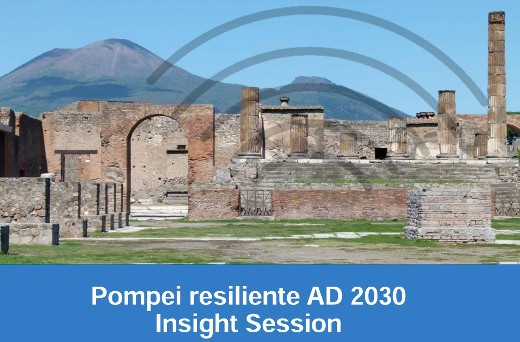The internal staff of the Archaeological Park of Pompeii will take part in the first workshop, named ‘Resilient Pompeii AD 2030, Insight Session’, scheduled for October 19th, where they will discuss the project’s progress and the action required for its implementation. The local community will also be involved in this phase through Civitates, a social innovation project, which is an extension of Smart@Pompei, aimed at promoting skills and initiatives for the local cultural tourism.
The Archaeological Park of Pompeii stands out as Italy and the world’s first Smart Archaeological Park, an integrated technological model that allows to manage and control the safety of visitors and monuments in both normal and emergency conditions. The project is the result of a 7-year framework agreement signed in May 2015 by the Ministry of Cultural Heritage and Activities and Tourism (MiBACT) and the National Research Council (CNR) in order to identify and promote research and innovation programmes, as well as demonstration and educational programmes in the cultural heritage and tourism sector.
In March 2016 an Operating Agreement was also signed by the Secretary General of MiBACT and the President of the CNR. Both parties expressed interest in designing an integrated technological solution to improve the safety of the National Cultural Heritage.
Video surveillance, access control, anti-intrusion systems, seismic and hydrogeological monitoring, quality of air and drones are to be integrated, controlled and managed using a smart operative Platform that will constantly monitor all the sensors spread throughout the Archaeological Park, generating alarms when thresholds are exceeded and abnormal behaviours or emergency conditions are detected. The main backbone of the integrated technological system consists of a fibre-optic network and a wireless network, which are made up of access points that provide services to meet the different needs of visitors, especially those with disabilities.
Thanks to the IoT (Internet of Things) technology, the technologically integrated system is scalable and flexible, so that other devices and components, as well as other useful sensors for optimal and sustainable site management, can be added at any moment.
The Steering Committee for the Operating Agreement stated that the integrated technological model is replicable also in other cultural and non-cultural contexts, highlighting that “technology on its own cannot guarantee safety and safety cannot be provided without technology”.
One of Smart@Pompei’s assets is Civitates, a social innovation project comprising a 6-month programme of action aimed at triggering the civic engagement of the local community. This means encouraging citizens to cooperate, promote the common good and foster initiatives of community cultural tourism. The goal of Civitates is to prepare the local community to face the future with new stimuli, prospects and knowledge and encourage the creation of new forms of local entrepreneurship to involve the community in the responsible development of its own territory.
Specifically, the Civitates Workshop in Pompeii will involve a group of young people (aged 18-35) living in Pompeii, who will take part in an educational experience that will last a semester, during which they will acquire professional skills to manage artistic, cultural and creative spaces and facilities. They will also have to promote an event based on ‘Musicians' Houses’, which will involve all citizens in creating cooperative civic networks.
Smart@Pompei: towards a more RESILIENT attitude in the territory.
Pompei, 18 October 2017


